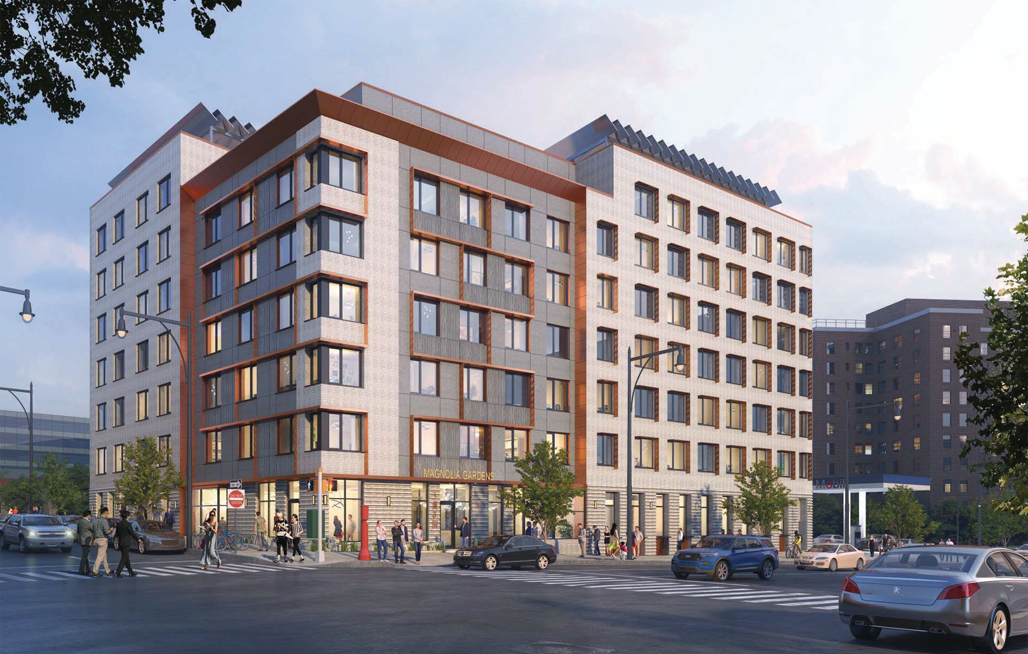What is Magnolia Gardens? Magnolia Gardens will be the first transitional housing facility for families with children in Flushing, Queens. The project (located on College Point Boulevard) will include 90 modern apartments and an array of services to help unhoused and unstably housed families get back on their feet, making the community stronger, safer and more resilient. Magnolia Gardens will offer Asian language services, a first for a facility of this kind in New York City, and connect vulnerable neighbors experiencing housing instability, including historically under-served AAPI families, to this critical resource where they will receive culturally competent services.
How will Magnolia Gardens serve vulnerable families? Families with children will live in Magnolia Gardens’ apartments for approximately one year, while receiving robust services including weekly case management, referrals for medical care, life skills training, access to recreational activities for children and after school programs, childcare and workforce training and placement. When ready, each family will receive assistance to make the transition to permanent affordable housing.
How will families be selected? To be eligible for Magnolia Gardens, families must have a child under the age of 21. Placement for transitional housing will be prioritized based on the child’s school and/or previous residence in Queens Community District 7. Families will be placed through the City’s Prevention Assistance and Temporary Housing (PATH) intake center in the Bronx.
Who will operate Magnolia Gardens? Magnolia Gardens will be a NYC Department of Homeless Services (DHS) transitional housing facility operated by Urban Resources Institute (URI). URI is the largest provider of temporary housing for survivors of domestic violence and their families in the nation and a leading provider of temporary housing to unhoused families.
Who is developing the project? URI and Asian Americans for Equality (AAFE) are co-developing the site on College Point Boulevard. The state-of-the-art building will be contextual to the neighborhood. In the new 7-story development, each family apartment will be fully equipped with kitchens and bathrooms. There will be a community room accessible to the public and the property will have 24-hour security. The building will incorporate the principles of Feng Shui orientation, space planning, directional energy and the influence of the five-elements (earth, metal, water, wood, and fire) and colors to the building design.
How long will construction last? Pre-development work began on the site in March 2024 and construction will continue for approximately 20 months.
What steps are being taken to ensure equitable access to Magnolia Gardens? A group of AAPI-serving nonprofit organizations in Flushing have come together to strengthen access to transitional housing supports for eligible AAPI families with children. Participants include: Chinese-American Planning Council, Korean American Family Service Center, Garden of Hope, Womankind, Korean Community Services, Child Center of NY and South Asian Council for Social Services. These groups will refer families in need of transitional housing and participate in community outreach initiatives. AAFE will help families learn about the PATH intake process.
Why is there a need for a facility of this kind in Flushing? There are nearly 37,000 residents in the Flushing area (Queens Community Board 7) living below the federal poverty level, and more than 20,000 of these individuals are Asian American. Almost a quarter of Asian American New Yorkers overall are living in poverty. Many families in Flushing find themselves in illegal basement apartments, unsafe hotels, overcrowded apartments with extended family members and, in some cases, on the street with no housing at all. Magnolia Gardens’ will provide an unprecedented level of compassionate care to help our most vulnerable families stabilize their lives.
How can the community engage with Magnolia Gardens? A Community Advisory Board (CAB) will be formed shortly before the facility’s opening. It will be made up of Flushing-area stakeholders – residents, small business owners, nonprofit service providers and members appointed by elected officials. They will provide valuable feedback regarding the project’s operations, security measures, and utilization by families with children. The CAB will address any operational and safety impacts on the surrounding community.
玉蘭花園
問與答
玉蘭花園背景?
玉蘭花園將是位於皇后區法拉盛的第一個供有孩子家庭使用的過渡性住房設施。這個位於大學點大道的項目將包括 90 個現代式公寓和一系列服務,幫助無家可歸和居住不穩定的家庭重新站穩腳步,使社區更加強大、安全和有韌性。玉蘭花園將提供亞裔語言服務,這在紐約市的此類設施資源中是首次,並將把經歷住房不穩定的弱勢鄰居,包括歷史上被忽視的亞裔美國人家庭,與這一至關重要的資源聯繫起來,他們將接受文化相關的服務。
玉蘭花園將如何為弱勢家庭提供服務?
有孩子的家庭將在玉蘭花園的公寓中居住約一年時間,同時接受豐富的服務,包括每日案件管理、個人和團體諮詢、醫療保健轉介、生活技能培訓、兒童娛樂活動和課後計畫、托兒服務以及職業培訓和就業安置。當準備好時,每個家庭將獲得財務援助,以完成過渡到永久的負擔得起住房。
搬入玉蘭花園條件?
符合入住玉蘭花園資格的家庭必須有 21 歲以下的子女。過渡性住房的安置將根據孩子所在學校和/或在皇后社區第 7 社區委員會範圍內的先前住所為基準進行優先安排。家庭將通過位於布朗士的市府預防援助和臨時住房(PATH)接待中心進行安置。
玉蘭花園的管理機構?
玉蘭花園將是紐約市遊民局(DHS)轉型住房設施,由城市資源研究所(URI)運營。 URI 是全國最大的提供臨時住房給家庭暴力幸存者及其家庭的供應機構,也是無家可歸家庭的主要臨時住房組織之一。
建設玉蘭花園的機構?
URI 和亞洲人平等會(AAFE)將共同開發位於學院點大道的場地。這座最先進的建築將與社區環境相襯合。在這座新的 7 層開發項目中,每個家庭公寓將配備完整的廚房和浴室。將設置一個對公眾開放的社區活動室,並且該物業將有 24 小時的安全保衛。建築將納入風水方位、空間規劃、方向能量以及五行(土、金、水、木和火)和顏色對建築設計的影響的原則。
施工耗時多久?
從2024年3月開始施工,為期約20個月。
為確保對玉蘭花園住客的公平篩選,將採取以下步驟:
許多為亞裔社區提供服務的非營利組織已經聯合起來,以加強對符合資格的亞太裔家庭及其子女的過渡性住房支援。參與的組織包括:華策會、韓裔家庭服務中心、勵馨花園、婦女之家、韓國社區服務、紐約兒童中心和南亞社會服務委員會。這些團體將轉介需要過渡性住房的家庭,並參與社區外展計劃。亞洲人平等會將幫助家庭了解 PATH 接待過程。
在法拉盛建立這樣一個設施的原因
在法拉盛地區(皇后區第七社區委員會)有將近 37,000 名居民生活在聯邦貧困水平以下,其中超過 20,000 名是亞裔。幾乎四分之一的亞裔生活在貧困中。在法拉盛,許多家庭居住在非法的地下室公寓、不安全的旅館、與親屬共同居住的擁擠公寓中,有些甚至無家可歸。玉蘭花園將提供前所未有的關懷,幫助我們最脆弱的家庭並穩定其生活。
社區可以如何支持玉蘭花園的工作?
在設施正式開放前,將成立一個社區顧問委員會(CAB)。該委員會將由法拉盛地區的利益相關者組成,包括居民、小型企業主、非營利服務提供者以及由民選官員任命的成員。社區成員可以提供意見和反饋,幫助玉蘭花園更好地了解社區的需求和期望,以便提供更好的服務。該委員會將解決對周邊社區的運營和安全產生的任何影響,共同建立一個更加繁榮和共融的社區。

